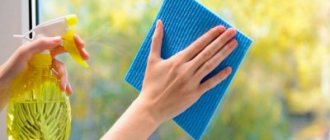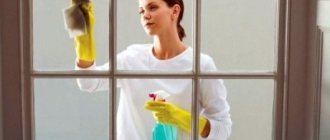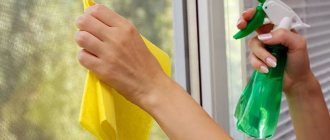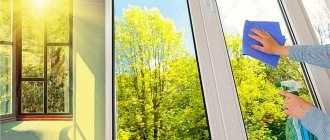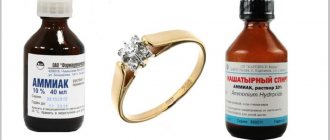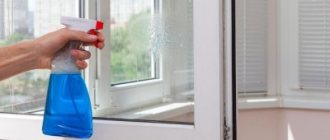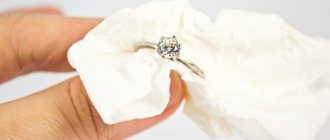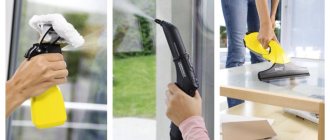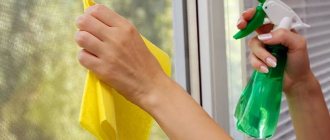For cleaning glass
An alternative to windshield washer fluid is a mixture of ammonia and water. Alcohol quickly evaporates and leaves no traces behind; manufacturers add it to cleaning mixtures. You can make the solution at home yourself: dilute 30-50 ml of ammonia in 500 ml of water. Such a low concentration helps to effectively clean the glass from dirt and will not cause an unpleasant suffocating sensation for the driver. The solution can be poured into the windshield washer fluid reservoir or washed with it on the glass, and then wiped dry with a clean microfiber cloth. However, this cleaning method can only be used in the summer; in winter, the liquid freezes.
What is ammonia and where is it used?
Ammonia, or ammonium hydroxide, which is sold in pharmacies, is nothing more than an ammonia solution. The colorless liquid in a dark glass bottle resembles water in consistency, but the strong specific smell will prevent the solution from being confused with anything else.
- Ammonium hydroxide is used in medicine: it is used for rubbing and cleaning the stomach, as a compress, for inducing fainting and other needs. In everyday life, the solution is used to remove stains from clothes, clean silver, dishes and tiles, oil-painted walls and other things. As for the use of ammonia in the fight against cockroaches, this method has existed since the time when our mothers and grandmothers did not even have access to the famous Mashenka crayons.
They dissolved the liquid in water and wiped the floors, furniture, and bathroom tiles with the solution. It is believed that Prussians cannot stand the smell of ammonia, and therefore avoid apartments where surfaces have been treated with this product.
Below I will tell you in what proportions to prepare a solution of ammonia with water for cleaning, how often surfaces should be treated, and why Prussians are afraid of certain odors. And as a bonus, I’ll tell you what other smells can scare away annoying insects from your home.
Other life hacks
What else can be quickly and safely cleaned with ammonia:
- Greasy clothes. Mix 25 g of salt and 5 ml of alcohol. Apply to fabric, wait 15 minutes and wash as usual.
- Perfume stains. Mix water and ammonia 1:1, blot the stain and wash after 15 minutes.
- An aqueous solution of ammonia 5:1 cleans mirrors, chandeliers, vases.
- The same composition can be used to wash tiled surfaces in the kitchen and bathroom. Ammonia provides a disinfecting effect.
- Using a cotton pad soaked in ammonia, occasionally wipe the soleplate of the iron. The device will stay clean longer.
Our mothers and grandmothers actively used ammonia, and the houses were always clean and comfortable. Today, the variety of household products has pushed such life hacks into the background. I advise you not to forget the traditions of your ancestors: this greatly saves the family budget.
Window cleaning
Ammonia is great for cleaning windows. He will make sure that they shine clean for a long time, and will protect their surface from dust and dirt for as long as possible. The main thing is to correctly calculate the dosage. Indeed, despite the fact that the product quickly dissolves acids and easily copes with any contaminants, it has a characteristic pungent and unpleasant odor.
In order to make the correct solution, you need to mix one tablespoon of ammonia with 1 liter of water. You can start washing. It is most convenient to use a spray bottle. Then rub the washed surface with soft paper or newspaper.
What is ammonia
Ammonia is a solution containing ammonia. It has a sharp, specific smell that cannot be confused with anything else. Ammonia perfectly dissolves acids, for this reason it will not be difficult for it to deal with old contaminants. The most important thing is to correctly calculate the proportion and make the solution in accordance with all the rules.
Many housewives have heard about the properties of ammonia as a detergent, however, not everyone knows how to use it correctly. But with its help you can significantly reduce the window cleaning time and reduce labor costs. Therefore, in this article I will tell you in detail how to wash windows with ammonia.
Ammonia allows you to quickly and easily clean windows
| Ingredients | Quantity |
| Ammonia | 5ml |
| Water | 5l |
In this case, ammonia is added to the water and mixed thoroughly. Despite the fact that this solution is extremely simple, it copes well with stains, not only on glass, but also on other surfaces.
| Ingredients | Quantity |
| Water | 200 ml |
| Glycerol | 200 ml |
| Ammonia | 5 drops |
This solution is prepared quite simply:
- first of all, you need to dilute glycerin in water in a one to one ratio;
- after this, add a few drops of ammonia to the composition and mix it thoroughly.
It should be noted that this solution not only copes well with dirt, but also protects the surface of the glass from icing in the winter. In addition, the thin film it forms on the surface prevents glass from becoming dirty.
We suggest you familiarize yourself with means for removing limescale from faucets in the kitchen and bathroom
Here, in fact, is all the information on how to dilute ammonia to prepare detergent. It should be noted that accuracy is not required in this case
It is only important to approximately follow the proportions
In the photo - a window cleaning sponge
Before washing windows with ammonia, you need to prepare the following equipment:
- container into which the cleaning composition will be poured;
- foam sponge;
- newspapers;
- several soft cloths;
- latex gloves.
Window cleaning
The main stages of washing windows using ammonia
First of all, you need to wash the window frames
First of all, you need to clean and wash the window sill and profiles (window frames) with your own hands. You should not start cleaning glass without completing this procedure. The work is carried out in the following sequence:
- First you need to remove all objects located on the windowsill. In addition, curtains or blinds should be removed;
- then you need to remove dust from the frames and window sills. To do this, they can be vacuumed or wiped with a damp cloth;
- after this, the surface must be cleaned with a solution of ammonia in water to get rid of stubborn stains and other contaminants;
- At the end of the work, the solution should be washed off with a wet sponge and then wipe the surfaces with water.
Now you can proceed to the most important stage - washing the glass. Instructions for doing this work look like this:
- First of all, you need to wash off the dirt with a sponge. To do this, dip a sponge in a solution based on ammonia and treat the glass with it. Be sure to wash them from top to bottom, and not vice versa, so that dirty streaks do not remain on the glass.
Dip a sponge or rag into the solution and wring it out lightly
There should be no dirty spots or other contaminants left on the surface of the glass. To thoroughly clean hard-to-reach places, for example, the top of windows from the outside, you can use a mop;
- Now the surface of the glass should be polished with newspapers or a soft cloth. Thanks to the detergent, this will not be difficult. The result is high-quality washing without streaks, and this requires a minimum of time and your effort.
At this point the work is almost completed. The only thing is, before installing the blinds, as mentioned above, they also need to be washed. This is done as follows:
- take a sock, preferably made of natural fabric, and put it on your hand;
- then dip your hand in the detergent solution;
- after this, carefully wipe each plate from the outside and inside;
- Then each plate should be wiped dry with a dry soft cloth. After this procedure, the blinds will look like new.
What types of window cleaning products are there?
Depending on the composition, window cleaners can combat different types of stains. There are several types of cleaners:
- Alcohol based
Most glass cleaning products are alcohol based. For their manufacture, different types are used:
- Isopropyl. Has pronounced solvent properties. It removes fresh grease from glass and light stains well. Does not require additional rinsing with water. Products based on it are inexpensive, but will not be able to cope with severe dirt and old grease stains.
- Benzyl. Often, in addition to benzyl alcohol, foaming agents are included in the base of the cleaner. They remove old stains more effectively. You don't need to put a lot of effort into using them. They do not leave streaks or soap residue.
- Based on ammonia
Ammonia is often used in glass cleaners. The active ingredients cope well with even the most difficult stains. Ammonia quickly evaporates from the surface, giving it a glossy shine, without streaks.
- Based on surfactants
Today, glass cleaners based on surfactants (surfactants) made from plant materials are becoming increasingly popular. They do not harm the environment and decompose quickly. In addition, they do not cause allergies, have no pungent odor and effectively remove dirt, dust and grease from the window surface. But with all the advantages, there is also a disadvantage - the expensive price.
Additional components
Manufacturers often add additional substances to the main ingredients to enhance the effectiveness of the spray. Among them:
- Antistatic. Repels dust. Prevents small particles from the air from sticking to glass. Due to this, they remain clean longer.
- Silicone. Just like an antistatic agent, it helps the glass acquire dirt-repellent qualities.
- Water-repellent substances. Due to these ingredients, water does not linger on the glass, but rolls down. Drops after rain do not dry out and do not leave dirty marks. The “anti-rain” effect also appears when the glass fogs up.
- Acids. They should be included in cleaning liquids for glass in the bathroom or shower. The acidic component dissolves limescale. But they cannot be used for wiping iron parts.
General information
Features of use
Ammonia is an ammonia solution that has a strong unpleasant odor. One of the areas of its application is the removal of difficult-to-remove contaminants.
It is very effective, so it is added to household chemicals in factories. It is also added to glass and mirror cleaners.
The main feature of using ammonia is to take small dosages that should not be exceeded.
REFERENCE! Adding ammonia to the product provides it with good results and removes almost all types of contaminants.
Pros and cons of using ammonia
When using ammonia to prepare glass cleaning solutions, there are several advantages.
These include the following:
- - low cost;
- — efficiency of use;
- — ease of use;
- — availability — sold in any pharmacy;
- - economical consumption.
Among the disadvantages are:
- - unpleasant pungent odor;
- - Care must be taken when using it.
REFERENCE! Of course, the listed disadvantages may alarm someone, but you should not refuse to use this product because of them, since its effectiveness outweighs all the disadvantages.
How to choose a product
When choosing a suitable cleaning solution for glass, you should not rely on advertising promises or colorful packaging. There are more important criteria to consider when purchasing:
- cost of goods;
- no unpleasant odor;
- convenience of the sprayer;
- economical consumption;
- composition features.
For people prone to allergies, it is advisable to choose a product with a hypoallergenic formula. Sprayers based on natural surfactants are suitable. It is also important to take into account the degree of contamination. If the windows overlook a busy highway, then it is better to choose a more active cleaning formula.
Homemade Window Cleaning Recipes
An effective window cleaner can be made from substances available to any housewife.
Homemade cleaning solutions often include the following ingredients:
- lemon;
- alcohol;
- soap;
- starch;
- ammonia;
- vinegar;
- soda;
- glycerol;
If it is necessary to remove severe contamination, add potassium permanganate, ammonia and ash.
To wipe mirrors, it is recommended to use a cloth made of soft materials. This will help avoid streaks.
Water and lemon
One of the simplest and most affordable products to make with many positive reviews.
Homemade cleaning solutions often include lemon and water
It's easy to prepare the essence:
- Add citric acid or lemon juice in an amount of 50 g to one glass of water.
- Stir thoroughly.
- Wipe the surface with the resulting liquid.
For mild contamination, the concentration of lemon juice can be reduced . The advantage of the method is the absence of streaks and a pleasant fresh aroma: a lemon-scented flavor is added to many chemical compositions.
Starch
Starch works well with dust and stuck dirt.
A recipe based on it can be made like this:
- Add a tablespoon of starch powder to a liter of water.
- To stir thoroughly.
- Apply to the area with a sponge and leave to dry.
- Remove the remaining starch with a damp cloth and wipe with newspaper.
Raw potatoes are also used - they contain a lot of starch. The tuber is cut and rubbed on the surface, left until completely dry. To add shine, the surface is wiped with microfiber.
Black tea and vinegar
A lesser-known method of preparing glass cleaning liquid is a mixture of black tea and vinegar.
You can put a special spray nozzle on the bottle, which will make it easier to spray the liquid.
It’s easy to prepare, all you need is:
- Brew strong tea and let it brew.
- Add 3 tbsp. l. acids.
- Mix the ingredients thoroughly until the liquid acquires a uniform color.
The resulting liquid is applied to the surface, then washed off with water. The glass is wiped dry with a napkin or rag.
Vinegar and soda
Pure vinegar mixed with baking soda can even wipe off a marker or pen. This is relevant for washing old window glass and mirrors.
Simple cooking method:
- Pour 2 liters of clean water into a saucepan or other container.
- Add 100 ml of acid and 50 g of baking soda.
- To stir thoroughly.
Instead of soda, ordinary table salt is sometimes used; it gives the glass a distinctive shine. But the disadvantage of salt is that its crystals can scratch the surface, so you cannot wash PVC products with it.
Liquid soap and vinegar
When these substances are mixed, a foamy liquid is obtained that perfectly washes away most of the contaminants.
Cooking process:
- Add 2 tbsp. l. acetic acid per 500 ml of water.
- Pour in half a teaspoon of soap.
- Shake until foam appears.
If there is not enough foam, add more soap.
Details
About the concentration of the solution
How to dilute ammonia for cleaning glass
Before you start washing windows, you need to prepare a solution of water and ammonia. There are several ways to do this. But before that, you need to prepare your inventory. You will need:
- container for preparing the solution;
- sponge;
- napkins or rags.
Ammonia has a strong, unpleasant odor, and even when used in minimal quantities, good ventilation must be provided.
How much ammonia to add when washing windows
The usual method is the simplest and to prepare such a solution you only need ammonia and water. Necessary:
— fill the container with water (5 liters);
- add 5 ml of ammonia to it;
- mix the components thoroughly.
Although the method of preparing the solution is very simple, it turns out to be very effective.
Supplements
Cleaning windows with glycerin and ammonia
This recipe helps prevent ice from forming. If this is your goal, then you will need an additional component in the form of glycerin. In addition, after using this solution, the glass will shine.
Glycerin does not have the ability to clean dirt and remove stains. It is added to the composition so that the glass acquires shine. A bonus to this is that glycerin helps prevent frost from appearing on windows in winter and dust from settling.
Instructions:
- - pour a glass of water into the container;
- - add 200 ml of glycerin;
- - pour 5 drops of ammonia;
- - mix everything thoroughly.
REFERENCE! After using this solution, less dust will settle on the glass.
Cleaning streak-free windows with ammonia
Before you start cleaning the glass, you should first prepare for this procedure. To do this you need:
- - remove all foreign objects from the window;
- - remove curtains, tulle;
- — in the presence of heavy contamination, you must first wash off the main dirt and dust. Remove cobwebs, wipe the glass with a damp or dry cloth.
Windows should be washed in the following order:
- Wash frames and slopes. This is done with any suitable solution, which includes ammonia solution. It is best to do this with a sponge or rag.
- Wash the glass using a sponge or rag. If the windows are high, you can use a special mop to reach all areas.
- It is necessary to wash off dirt from top to bottom so as not to smear dirt on the glass.
- Wipe the glass dry.
- Clean the blinds.
REFERENCE! A small amount of ammonia in cleaning solutions does not harm metal-plastic materials.
3 alternative ways
If for some reason you cannot use ammonia, then there are other means that give good results, which are available in every home. What they have in common is accessibility and good cleaning results after use.
Vinegar
Depending on how dirty the window is, you need to select the optimal concentration of the cleaning solution. The usual recipe is based on mixing 0.5 liters of water, 50 ml of vinegar and 0.5 tsp. dishwashing detergents.
This recipe can be used to remove dirt and stains well. After using this product, the glass begins to shine and there are no streaks on it.
Dentifrice
If the glass is too dirty, you need to use tooth powder or chalk.
Preparation of the product is based on mixing a liter of water with 50 grams of powder. The prepared solution must be applied to the glass and then cleaned with a napkin. Do this when the product dries a little.
REFERENCE! Heavily contaminated areas should be treated separately, using a more concentrated mixture of powder and water to obtain a paste.
Onion
A head of onion, cut into two halves, can help remove stains on glass. Onions can help get rid of streams, insect marks and other contaminants.
To make the stains disappear, rub the stains with a fresh onion cut. After this, the window should be washed in the usual way.
REFERENCE! The onion method is quite labor-intensive for cleaning the entire window, but it’s just right for getting rid of local dirt.
Rules for washing windows: the basics
It is not only bad weather outside the apartment that makes the openings dirty. In addition to rain, wind and snow, tobacco smoke, condensation, and insects leave unclean imprints on the surface. Ideally, it is recommended to clean the openings once three months, that is, after the change of each season of the year. But in order for the washed windows to remain unstained for as long as possible, it is recommended to follow the rules.
Weather
It is necessary to clean windows at appropriate times. It should be calm and cool outside. The ideal weather is cloudy without precipitation.
Choosing the right time to wash your windows will help you do it without streaks. Strong wind or sun will help the moisture dry out quickly, leading to streaking. And also, too sunny a day will not allow you to correctly assess the cleanliness of the window glass.
Window cleaning tools
Necessary tools for cleaning windows:
- Basin for soap solution,
- Water bucket,
- Soft sponge,
- Microfiber cloth for cleaning.
And it is also recommended to use a special scraper. It will help you safely clean your windows from the outside.
Advice! To thoroughly distribute the cleaning product onto the glass, it is recommended to use a spray bottle.
Traditional methods of washing windows
There are several proven ways to clean glass without streaks. When there was not yet such a wide choice for chemistry, housewives did an excellent job with the means at hand.
Newspaper
The first step is to do the following:
- Dilute the soap component in warm water;
- Wipe the glass with a generously moistened sponge;
- Remove all contaminants;
- Rinse the surface with clean water 2-3 times.
After which you need to take several newspapers and wipe the glass with them while the surface is still wet. The paper will quickly absorb excess liquid without leaving any streaks. And also for a better effect, it is recommended to finish wiping the glass with nylon tights.
Chalk
After washing with soapy liquid, you need to prepare a solution. How to make window cleaner:
- Clean water – 1 liter;
- Chalk or tooth powder - 2-3 tbsp. spoons.
The ingredients must be mixed and washed with the resulting glass solution. Wait until they dry and wipe with a clean cloth or napkin. It is recommended to use newspapers.
How to clean without streaks and streaks?
Adhering to a clear sequence of actions, cleaning the window efficiently, and, importantly, without streaks, will not be difficult:
- Preparatory stage. The window sill is cleared of all objects, blinds or roller blinds are removed from the windows. Using a vacuum cleaner or a slightly damp cloth, remove dust from the frame and window sill. A sponge soaked in a soap solution will help get rid of stubborn dirt.
- Glass washing. First, wash off the dirt with clean water. After which, the glass is wiped with a soft sponge soaked in a solution of glycerin and ammonia. To prevent smudges from remaining on the glass, movements should be carried out from top to bottom.
- The final stage is polishing. A microfiber cloth is ideal for such purposes. It does not leave lint on the surface of the frames or streaks on the glass.
After the cleaning is completed, the windows are left for three to four hours to air. This will help get rid of the unpleasant smell of ammonia.
Store funds
Store funds
Nowadays, stores are full of all kinds of window cleaning products, and they are all expensive. Their price is understandable: production costs, wages to workers, promotion of goods, advertising and other expenses need to be recouped, and even a little money must be made so that the owner of the “brand” can buy himself a small island in the Mediterranean Sea. The buyer's pocket suffers from this.
Most often, solid particles (dust, grains of sand) and greasy particles (fingerprints, insect marks, greasy deposits from the stove) collect on the windows. Only a high-quality window cleaner can deal with all these contaminants.
The composition of purchased products usually includes: water (universal solvent), ethyl alcohol, surfactants (surfactants).
- Alcohol dissolves everything that water could not dissolve. In addition, it increases the penetrating properties of the liquid, helps it absorb into the cloth and is easily removed without leaving streaks.
- Surfactants provide the cleaning power of all store-bought products. They effectively remove both hard and fatty particles.
- Some products may contain ammonia for better grease removal.
So, we all know in practice that store-bought products are quite effective. And they are sold in special plastic containers with a dispenser, which are very convenient to use. However, they are too expensive and often cause allergies.
We use a special mop
If your house has very high windows, it is best to clean them with a special mop. Such options are sold in any hardware store and are not very expensive. The mop tip is double-sided, which is very convenient. On one side there is a sponge attached, and on the other there is a rubber scraper, which is used to polish the surface.
Mops are equipped with long handles, which allows them to reach the most difficult to reach places. This device can be used when washing windows with a solution of ammonia, and with the use of factory detergents. The most convenient way is to take a spray bottle to apply the solutions to the glass, and then wipe everything with a sponge and scraper. It must be remembered that the spray gun only works in a vertical position.
Ammonia is one of the most effective and inexpensive means for high-quality cleaning of windows without streaks. This solution does its job better than many expensive advertised products.
If the smell of ammonia seems unbearable, you can try replacing it with another inexpensive product that has proven to be effective. This can be ordinary vinegar or a solution of potassium permanganate. All these means give good results with a minimum of cost and effort.
Household chemicals for cleaning windows
Manufacturers of household chemicals offer a wide range of special preparations. They are conveniently packaged, equipped with sprayers and give a good effect.
The most popular means include:
- Mister Muscle;
- Clin:
- Cif;
- Sanita;
- Help and others.
Household chemicals for cleaning glass are easy to use and give good results.
These preparations are intended directly for washing glass. They are well distributed over a vertical surface and do not leave drips or streaks when wiped with a napkin.
Using vegetables for harvesting
You can solve the question of how to wash windows simply by using potatoes or onions. And clean surfaces that have been infested with flies, perhaps wiping them with a cut of an onion. After washing off the onion juice with water, wipe everything with a dry cloth.
Raw potatoes are another product that is often used in cleaning. For high-quality cleaning, it is enough to cut the tuber in half and treat the contaminated areas with the cut side.
Powder for brushing teeth: a non-standard solution
Tooth powder is now rarely used for its intended purpose. But for removing stubborn stains, it’s exactly what you need. It can be used in the same recipe as chalk. The powder will also leave behind a residue, which can be easily removed with a clean, dry cloth.
Rag, napkin, shaving and more
You can wash windows with rags, napkins or a special tool. The main requirement is a lint-free surface. The following materials are suitable:
- linen;
- microfiber;
- cotton;
- spandex, etc.
You can also use sponges. Convenient are those that have 2 sides made of different materials: soft on one side and hard on the other.
A squeegee is a convenient device, especially for washing inconvenient places. A special mop with a long handle will help remove excess moisture from the windows. This device is especially convenient when washing large windows. You need to work with this tool carefully, moving it mainly horizontally, starting from the top of the glass. For severe dirt, you may need a scraper with a rubber attachment.
The telescopic handle will help you wash even large window openings
It is recommended to wash those areas of glass that cannot be reached by hand using brushes with a telescopic handle. This allows you to wash even the doors that do not open.
The following can be used for polishing glass:
- napkins;
- paper towels;
- newspapers.
Advice!
To remove stickers on glass, factory film and paint stains from the outside, it is convenient to use a special scraper with a blade.
A few more tips from experts
Below are several ways from cleaning service specialists that will help you get your windows in order efficiently and quickly:
- Windows should not be washed with products containing abrasive particles. This is due to the fact that they may cause scratches on the glass. The seal and frame may also suffer from this.
- It is not recommended to clean the window with the addition of strong solvents. Acetone or other solvents can damage the plastic and penetrate into the window chambers through holes. And this can reduce the quality of double-glazed windows and their heat-saving properties.
- The detergent remaining after cleaning the glass can be used to clean mirrors, glass furniture facades and other parts.
- When using a solution with ammonia, you should adhere to precautions, namely, protect your hands with gloves and your respiratory tract with a mask.
- All window cleaning work is best done with good ventilation.
- Ammonia cannot be used for cleaning windows in its pure form.
- After completing the cleaning using ammonia, the apartment must be well ventilated.
- Hard-to-reach places, such as fittings, can be cleaned with an old toothbrush and cotton swabs.
- It is better to wash frames and glass with different sponges.
- The final wiping of the glass must be done with absolutely dry, lint-free materials, for example, microfiber cloths, newspapers, etc.
REFERENCE! If the condition of the windows is too neglected, you may need to repeat the cleaning process until you get the perfect result and restore shine. But it is better not to let the windows reach this state, but to clean them regularly.
Washing glass with the addition of ammonia is not a difficult task, since all the methods are quite easy. The result is excellent - a shiny, clean surface without streaks. An additional advantage is saving money, since there is no need to buy expensive products.
Recommendations for cleaning glass
How to properly wash windows? Despite its simplicity, washing must be carried out taking into account certain requirements.
Among them:
- Preparing tools and cleaning products.
- It is recommended to carry out cleaning in non-sunny weather.
- All cleaning tools should be located on the inside of the window to prevent it from accidentally falling out.
- All work must be done very carefully.
- First they wash the frame, then the glass.
- Severe dirt requires more thorough treatment - with soaking and the use of a scraper.
- Polishing the glass after washing improves the quality of the cleaning.
For your information!
Commercial glass cleaner can cause allergies. This circumstance must be taken into account by allergy sufferers and give preference to traditional recipes for cleaning.
Methods of using ammonia in the car interior
The action of ammonia is based on the nitrogen components that make up the product. Ammonia perfectly dissolves even stubborn dirt from textile upholstery and removes dirt on the windshield and side windows. The substance evaporates very quickly and leaves no streaks behind. Due to the specific smell, ammonia can remove even strong “odors” from cigarette smoke and spoiled food.
You can buy a bottle of liquid at any pharmacy; it costs no more than 50 rubles. There are different concentrations of the substance on sale, but it is better to take diluted solutions with a mass fraction of ammonia of 10%. Before use, the substance must be diluted in water or another solvent, and then proceed with cleaning.
For interior cleaning
Over time, any car textiles, be it seats or the ceiling, develop traces of dirt and greasy stains that are difficult to remove. Ammonia can easily remove such stains. You need to take 100 milliliters of warm water and dissolve 20-30 milliliters of chemical liquid in it. The solution is applied to a sponge and the cloth on which there is dirt is cleaned. For greater effectiveness, you can add a tablespoon of dishwashing detergent or grated laundry soap to the alcohol solution. Rub the product into the textiles, and then wipe off the remaining foam with a damp cloth. Along with the contamination, the unpleasant odor will disappear from the fabric.
If the stain is difficult to remove, then you need to make a lotion: apply an alcohol solution to a cotton pad and leave it on the stain for 20-30 minutes, then wash it off with water.
For cleaning glass
An alternative to windshield washer fluid is a mixture of ammonia and water. Alcohol quickly evaporates and leaves no traces behind; manufacturers add it to cleaning mixtures. You can make the solution at home yourself: dilute 30-50 ml of ammonia in 500 ml of water. Such a low concentration helps to effectively clean the glass from dirt and will not cause an unpleasant suffocating sensation for the driver. The solution can be poured into the windshield washer fluid reservoir or washed with it on the glass, and then wiped dry with a clean microfiber cloth. However, this cleaning method can only be used in the summer; in winter, the liquid freezes.
Anti-fog
Ammonia helps relieve surface tension and prevents the formation of condensation. To prepare an effective anti-fog agent, you need to mix:
- 100 ml water;
- 100 ml glycerin;
- tbsp ammonia.
The resulting solution is used to treat glass both outside and inside. It is better to park the car in the garage overnight so that the windows dry out. The liquid not only helps prevent glass from fogging up, but also helps protect against mud stains, raindrops and ice.
For washing the body
Those car owners who prefer to wash their car themselves without a car wash will appreciate this very simple car wash. It consists of:
Despite its simple composition, the liquid easily removes fresh dirt and traces of road chemicals from the paintwork. You need to soak a clean towel in the solution and wipe the car body several times; if the car is very dirty, you can add a couple more drops of any dishwashing detergent to the solution. The foam is applied to the paint with a sponge and then washed off repeatedly with water. You can also add a couple of drops of ammonia to clean water to wash off the foam; it will give the body additional shine, and minor scratches will become invisible.
To remove unpleasant odors
Odors can be very persistent and can be difficult to remove. If milk was spilled in the car and it got absorbed into the textiles, or if you constantly smoked in the car, ammonia will help eliminate the foul “aroma”. It is enough to dilute 2 tablespoons of the chemical in a glass of water and apply it to a rag. Use a rag to wipe the seats, upholstery, panels, and windows. You can close the car doors to help the ammonia smell linger longer. If the unpleasant odor is persistent, then you need to leave an open bottle of alcohol solution in the car for a couple of hours.
Common mistakes: what not to do
In an effort to make the glass cleaning solution more effective and efficient, some housewives make mistakes. What not to do:
- Mix ammonia with chlorine-containing preparations.
- Use soda and abrasive cleaning powder. This may cause scratches.
- Using ammonia is too caustic.
- Use detergents intended for washing dishes. Such preparations tend to form too much foam, which will then be difficult to remove.
- Get started with cleaning all the windows at once. It is necessary to act gradually, washing one window after another. In this case, it is advisable to start from the inside of the window, and only then move on to the outside.
- Undertake to wash an unprepared window that is covered with foreign objects and curtains.
Advice!
When in doubt about how to clean windows, you need to stick to proven recipes or use household chemicals that are designed specifically for these purposes.
Clean windows are part of home hygiene
Cleaning sequence
In order for this process to be completed successfully and as quickly as possible, it is necessary to follow the sequence of actions.
First of all, you will need to thoroughly clean all window sills and window profiles.
This is very important, and without carrying out this procedure you should not start washing the glass itself. First you need to remove the curtains or blinds and get rid of everything that is located on the windowsill
These items will interfere with the work process and may be damaged by water that gets on them.
Window washing always begins with a thorough cleaning of the frames and window sill. All movements are made from top to bottom. This will prevent dirt from spreading further over the surface and will save the worker’s effort. To begin with, you can treat the surface with a vacuum cleaner. This will help get rid of various cobwebs and unpleasant insects. Then the window sill and frame are wiped with a sponge and foam. After this, the foam is carefully removed with a clean cloth soaked in water. Then the surface must be treated with a solution of ammonia, possibly without glycerin.
Next, you should proceed directly to washing the glass. This is the most difficult and responsible part of the work. First of all, the dirt needs to be washed off with a sponge. To do this, the foam rubber is well moistened in the solution prepared according to the second recipe.
Windows need to be washed from top to bottom, this is very important. At the end of this process, it is necessary to polish the glass surface with a piece of soft cloth or newspaper.
After treating the glass with ammonia, this process will occur very easily.
If the windows have blinds, they can also be washed with ammonia. This is not difficult to do, but for this procedure you will need an old but clean sock. It is put on the hand over the glove, moistened in the solution, and then each strip is grabbed and wiped. You can use another sock to wipe the blinds dry. This method is very effective for cleaning plastic light protection devices.
Features of washing PVC windows
Metal-plastic windows, unlike wooden ones, are more demanding to maintain. The smooth surface of plastic and glass cannot be cleaned with abrasive agents, as this can lead to defects - scratches.
The surface of window sills is very often not smooth, but rough. Uneven texture is more difficult to clean from dirt. To do this, it is recommended to use detergents in powder form or a soap solution.
Selecting funds
than
to wash windows , if there is no urgent need, you should avoid such potent drugs:
- acid;
- solvent (including acetone);
- bleach.
PVC windows require careful handling of frames.
In addition to washing frames and glass, attention must also be paid to mosquito nets. They are removed for the winter, and in the warm season, when they become dirty, they are washed in the shower using a cloth. Dusty, dirty blinds can also ruin the effect of a washed window. It is also advisable to clean them in a manner suitable for them, taking into account the properties of the material and the type of construction.
Advice!
Window washing can be combined with prevention - lubricating hinges, treating the seal with glycerin.
What not to clean plastic windows
Plastic windows, unlike traditional wooden ones, are more demanding on materials and cleaning tools. If you want to extend the service life of PVC window structures, then you should not use the following:
- Abrasive materials . Metal brushes, powders, powder-type products that contain abrasive particles. These materials leave scratches on the frame and fittings, and as a result, the structure will quickly lose its presentable appearance. Please note that soda is also an abrasive, and its use may leave white stains that are difficult to remove on the surface.
- Strong solvents . These are acetone, solvent-646 and similar compounds that can melt and deform plastic. Even in the absence of visible PVC defects, solvents can enter the chambers through hidden technological holes and significantly disrupt the properties of the air chambers, worsening thermal conductivity.
- Acid and alkaline compounds. Household chemicals used for cleaning metal and glass surfaces. Effective against rust and plaque, such materials dissolve polyvinyl chloride.
- Melamine and similar sponges. Contrary to popular belief, melamine is an abrasive and, therefore, leaves micro-scratches on plastic surfaces.
- Products not intended for plastic. There are many window cleaners on the market, but some of them can corrode plastic as well as solvents and acetone.
There are many window cleaners on the market, but some of them can corrode plastic as well as solvents and acetone. Now we know what not to do when washing plastic cones so as not to cause harm.
How to dilute ammonia - composition recipes
For a composition with ammonia to be effective, certain proportions must be observed.
- If the composition does not intend to use additional agents, then you need to dilute five drops of ammonia in five liters of water. The resulting mixture is thoroughly mixed.
- The composition can be improved. Glycerin is most often used for this. The following proportions are observed: add the same amount of glycerin and five ml of ammonia to 200 ml of water. The advantage of the composition is not only the thorough cleaning of the windows, but also the further protection of the plastic from spraying or the appearance of ice.
Water and lemon
You can replace vinegar with citric acid or lemon juice. The simplest recipe for washing plastic windows will look like this: for one glass of water, about 50 grams of citric acid, i.e. approximately 1 to 5. If the pollution is not industrial in nature, the composition can be made less concentrated, but there will still be no streaks.
There is a more complex recipe for a cleaning composition based on citric acid, which we will make with our own hands according to the following recipe:
- fill a suitable half-liter or liter jar with peels from fresh lemons;
- Fill the remaining space in the jar with regular table vinegar;
- close the jar tightly and leave to marinate for a couple of weeks;
- after a while, open the jar, strain into another container, you will get an excellent concentrate;
- This concentrate must be added to the water with which you will wash the windows, the result of your work will be simply wonderful, and the surface will not only be cleaned, but also disinfected.
However, not all home-made cleaning compositions are so environmentally friendly; for example, compositions based on ammonia are a priori made from chemicals. The main character here is ammonia.
Precautionary measures
When working with ammonia at home, it is important to remember your own safety. To do this you need:
- before starting work, open the windows and ensure a flow of fresh air - it is important that the room is ventilated not only during washing, but also after that, because staying in a room with unpleasant odors for a long time can cause illness;
- use personal protective equipment (the minimum is gloves and goggles, but it is recommended to supplement them with a respirator to protect your respiratory system);
- have access to running water so that if liquid gets on your skin or eyes, wash the affected areas as soon as possible.
It is not recommended to use other household chemicals together with ammonia. This is especially true for products that contain chlorine. The fact is that as a result of their compounds, dangerous evaporation will occur, which can threaten health.
How to wash windows without leaving streaks
Windows are our view into the world around us, so crystal clear window glass is very important. In order to make them transparent and prevent the appearance of stripes and lines, you need to put in a lot of effort. This is probably why every housewife postpones the washing process until a special occasion. Let's try to figure out how to wash windows without streaks and special difficulties below.
How to wash windows without streaks at home
People living in ecologically clean areas, as a rule, do not have too much trouble washing such surfaces; they just need to wash off a little dust or sand.
However, for those living in industrial cities, it is more difficult to achieve clean glass. Largely due to the fact that not only dirt, but also grease from harmful fumes settles on them.
Therefore, it is doubly important for them to find the answer to the question of how to wash a window without streaks at home.
The entire course of work can be divided into several stages:
- You shouldn’t wash all the glass at once; first you need to completely clean one, and only then move on to the next. Moreover, it is best to start washing from its inner surface, which is much cleaner.
- First you need to dilute a little powder in a bowl of warm water and clean the glass surface using a sponge.
- It is important to wash not only the glass, but also the frame, handles and other elements.
- Be sure to wash the cleaning agent with cool, clean water.
- In order to avoid streaks, you can crumple newspapers and wipe the glass with them.
Washing windows with a special mop is quick and effective.
If part of the glass is dirty, it makes sense to use special wipes used to clean it.
When choosing how to wash a window, do not forget about washing it with a special mop, which has a sponge and a rubber scraper at the end.
Such a device must be dipped in soapy water, wrung out and carefully walked over the entire surface. In conclusion, you need to carefully wash the glass with the same mop, only you need to replace the water in the basin.
How to properly wash windows
To figure out how to properly wash windows, you need to first prepare some equipment:
- several types of sponges, differing in hardness;
- a mop with a foam tip or rubber scraper;
- dry cotton cloth;
- synthetic napkin;
- container with water;
- any foam-based dishwashing liquid.
It’s easy to clean windows efficiently without streaks if you follow these steps:
- using a foam sponge, moisten the entire surface, paying special attention to the places where the glass meets the frame;
- then take a rubber scraper and use it to remove excess water down to the windowsill;
- now moisten the surface with a sponge a second time;
- the main contaminants are washed out using a scraper; it must be held at an angle of 30 degrees and carried in a horizontal plane;
- after the scraper has reached the edge, it must be wiped dry;
- as a result of several movements of this kind, the glass surface will be completely dry;
- This method allows you to answer the question of how to quickly wash windows without much effort. Do not forget that in conclusion you need to step back a couple of steps and evaluate the work;
- if stains or dirt are found, they are carefully washed with a synthetic cloth;
- When the inside is washed, you need to repeat the procedure on the outside.
How to wash windows on a loggia or balcony on the street side
The first stage is washing the frames. Wooden frames are cleaned using household items. soap
The loggia, located on a high floor, requires extreme caution when cleaning the glass, so here the question of how to wash the window so that there are no streaks comes in second place, after the question regarding the safety of the owner.
Washing such surfaces, especially their outer sides, should be carried out as follows:
- first open the windows and thoroughly wipe the frames;
- if they are made of wood, you can use ordinary laundry soap, if they are plastic, then any soap product;
- wash the windows from top to bottom, rubbing the cleaning composition in a circular motion;
- if the frame cannot be opened, the answer to the question of how to wash the outside of the window is as follows: wash them using a scraper with a long telescopic handle, this type of brush must be moved from the far side of the window towards you;
- after all the dirt has accumulated in one place, it needs to be scraped from top to bottom and removed;
- Now the procedure needs to be repeated, only using clean water for rinsing.
If the apartment is on a high floor, then it is better to entrust the work of washing windows on a balcony or loggia to professionals.
It is worth noting that glass on the balcony is not cleaned very often, so in cases where you live on high floors, it is best to use the help of specialists.
They know how to wash balcony windows effectively and safely, and they don’t charge too much money for the services.
Professionals wash glass using various means and methods, leaving it squeaky clean and free of any streaks.
How to make window cleaner at home
Existing liquids do not always help figure out how to wash windows quickly and effectively; many housewives prefer to make their own streak-free window cleaners, which are no less or even more effective than store-bought ones.
Clean drain holes. If they are clogged, the windows will fog up a lot.
Rinse the window sill
Also using a sponge and soap solution.
If the window sill and frame remain yellow after this , then you can use Soda Ash Solution .
Soda ash solution
To bleach plastic, take 1 tbsp. l. soda ash and the same amount of washing powder. Mix them thoroughly in a liter of warm water. There should be no grains left. Treat surfaces.
A mixture of ammonia and peroxide in a 1:1 ratio can also help out in especially difficult cases.
Important! Products containing abrasives cannot be used for this purpose.
Wipe the plastic
A dry, soft cotton fabric, such as flannel, is suitable for this. Locks and handles should also be thoroughly wiped with a cloth.
Wash the glass
You can use either a purchased ready-made product or mix it yourself at home.
For example, a few recipes:
- Ammonia and water in a ratio of 1:10.
- 3 tbsp. l. chalk powder per glass of water.
- 2 tbsp. l. shavings of laundry soap per 1 liter of water.
Remove stubborn stains
Bird droppings, marks left by flies and other dirt that cannot be cleaned with a regular sponge can be removed with a blade.
Shine up
After the main dirt has been removed, you can wipe the glass:
- For shine, use a vinegar solution (for 1 glass of water, 2 tablespoons of vinegar);
- To prevent windows from freezing with a salt solution (2 tablespoons per glass of water);
- To keep the glass clean longer, use a mixture of water and glycerin 3:7 and a couple of drops of ammonia;
- Simply rinse the glass with clean water.
Remove water without streaks
Grandma's way
Use a dry cloth, well-crumpled newspaper or paper towels for this. Carefully wipe the entire surface with a rag and polish the glass with crumpled newspaper.
If the newspaper gets wet, take a new one and continue until we get rid of all the stains.
Modern way
OR you can use a special rubber scraper or squeegee .
They should start driving water from above. You need to move the screed horizontally, from one side to the other. In this case, each subsequent path should slightly (by a couple of centimeters) overlap the previous one.
The rubber brush should be wiped with a dry cloth from time to time.
After using the scraper, there will likely be water left in the immediate vicinity of the frame. It needs to be removed with a regular soft cloth.
Clean windows are not that difficult. Now you know about this for sure.
Rate us: Loading...
Source: https://LadyTag.ru/93-kak-mit-okna-bez-razvodov.html
Pros and cons of the method
This streak-free window cleaning method has both advantages and disadvantages.
The advantages include the following:
- Acceptable price. A bottle of ammonia will cost much less than special solutions intended for these purposes.
- The method is quite simple. Yes, you need to prepare some tools in advance, but every home has them on hand. In addition, there is no need for lengthy preparation - the windows can be washed immediately after preparing the solution.
- The most important advantage for any housewife is efficiency. After all, with the help of ammonia you can quickly remove any stains, as well as dust or dirt, which will not harm the plastic profile or the glass itself.
The disadvantages of the method include a specific smell, which many will find unpleasant. You can get rid of it only after thoroughly ventilating the room for several hours.
Another disadvantage is the threat to the nasal mucosa or skin. To avoid such a danger, it is recommended to use rubber gloves and even a respirator while working.
Using a solution with ammonia, you can bring any glass objects to perfect shine. If there is a little solution left after washing the windows, you should not pour it out, because it can be used to clean many other items in the house.
Useful tips for work
No one argues that windows need to be washed only in good weather, that is, when there is no rain. However, as experienced housewives recommend, it is best to carry out this procedure on a cloudy day. The fact is that in sunny weather, the ammonia solution will dry out too quickly, which will not make it possible to polish the glass, and they will remain stained and stained.
If there are traces of insects on the window, you can get rid of dirt with freshly squeezed onion juice. Alternatively, you can simply apply half an onion to the contaminated area, and everything will quickly wash off. And you can make windows more shiny for a long time if you treat them with a starch solution. Some housewives recommend rubbing glass with linseed oil. This will give them shine and repels dirt.
You need to be very careful when working with ammonia. When preparing the solution, you must try not to inhale the vapors of ammonia.
After cleaning, the room where the solution was used must be thoroughly ventilated.
When cleaning windows, you should use rubber gloves to protect your hands. Under no circumstances should you touch your face or rub your eyes. If the solution gets on the mucous membranes of the eyes or mouth, rinse everything thoroughly with clean water.
Instructions on how to use ammonia for windows
Before you start washing the surface of the windows, you should find out in what proportions you should mix the necessary ingredients. Solutions should be prepared in various ways, each of which can easily remove old stains. We will present several options from which each housewife will choose exactly the one that suits her:
- Composition No. 1. You need to take 5 liters of water, then take 5 ml of ammonia and mix everything;
- Composition No. 2. Take 0.2 liters of water, then add 5 drops of ammonia and 0.5 liters of glycerin.
The latter composition differs in that after it the double-glazed windows become much less dirty, and in winter it provides additional protection against ice. In addition, the glass is given an unusual bluish tint.
Cleaning the blinds
Using any of the two solutions presented, it is possible to easily organize the washing of blinds.
- First the eye must be opened;
- Place the plates along the frame;
- Take a sock and dip it into the solution;
- For convenience, the sock is worn like a glove;
- Next, each plate is wiped on both sides and then wiped dry.
Composition with glycerin
Glycerin forms a thin protective film on glass
Water is mixed with glycerin in equal proportions. This mixture makes cleaning windows much easier and forms a thin protective film on them. Add ammonia to the resulting liquid at the rate of 10–12 drops per liter of solution. The composition is thoroughly mixed.
It is not recommended to add soda, chalk and other abrasive cleaning ingredients to cleaning mixtures, as they can scratch the glass. To give a bluish tint, you can add a pinch of blue to the prepared mixture.
Characteristics of the drug and methods of application
Ammonia is an ammonia solution that is almost impossible to confuse with anything else. Its peculiarity is a very pungent odor. However, in addition to its not very pleasant aroma, ammonia also has the quality of quickly dissolving acids. For this reason, it quickly removes dirt from the glass surface.
We recommend that you read
- How to quickly and without streaks wash the windows at home yourself?
- Instructions: how to wash plastic windows yourself
- How to safely wash windows on a balcony outside
When working with ammonia, it is very important to be able to correctly calculate the dosage of the product to prepare a high-quality solution: if you make a mistake in the proportions, washing windows will turn into a real challenge.
Ammonia has been used at home for high-quality window cleaning for a very long time. During this time, housewives found the most suitable proportions of ammonia solution to create a good detergent. Two options are considered the most effective. Experienced housewives recommend using them.
In the first case, take 5 ml of ammonia per 5 liters of water and mix everything very thoroughly. This is the simplest and most economical option.
The second method of creating a detergent consists of 200 g of water and 0.5 liters of glycerin. Add 5 drops of ammonia to this mixture and mix well. Such a solution not only effectively cleans windows from dirt, but also creates a protective shell on the glass, resulting in less staining of the surface in the future. This detergent is good for cleaning windows both in the house and in the car.
Safety precautions when cleaning windows with ammonia products
Window cleaners containing ammonia must be used with gloves.
Cleaning windows requires care, as does handling ammonia. In order to safely wash windows with ammonia, you must follow these rules:
- Dilute ammonia in water in a well-ventilated room.
- Avoid dangerous leaning towards the street, especially on upper floors.
- When cleaning high windows, use a special brush with a long handle so as not to stand on a stool.
- Make sure you have reliable support for your hands and feet when working on the outside of the sashes.
- When washing windows with ammonia, wear rubber gloves.
- Do not touch your face with gloves or rub your eyes. In case of accidental contact with ammonia solution, thoroughly treat the affected area with water.
- After cleaning, ventilate the room until the smell disappears completely.
These simple rules will help protect you from possible injuries and other troubles that sometimes happen when cleaning.
Ways to protect glass from dust and ice
By treating glass with a solution of table salt, you can protect it from the formation of frosty patterns.
Using self-made solutions, you can not only clean windows, but also protect them. A mixture of water and ammonia with the addition of glycerin creates a thin coating on the surface. This film protects the window from contamination.
In frosty weather, treatment with glycerin prevents the glass from becoming covered with ice. You can also protect the window from ice patterns by wiping it with a salt solution - 1-2 tbsp. l. per glass of water.
What you will need
Before starting the process, it is advisable to prepare all the necessary tools. At home, this will require a container in which ammonia and water will be diluted. In advance you will need to find a sponge or soft lint-free cloth - in general, anything that will be convenient to work with. When working on large areas, it is recommended to use a spray bottle.
Washing windows with ammonia will not work without:
- paper, magazines or newspapers - they will help wipe off the applied product;
- soft cloths, with the help of which the remaining composition is removed from the glass;
- rubber gloves, plastic goggles and other safety equipment - some women even use polyethylene raincoats to protect their skin and clothing.
When cleaning windows, you will need to reach distant surfaces. In a private house or apartment with a high ceiling, it is best to use stepladders and sliding stairs.
Onion
Experienced housewives know that onions are great for removing traces of flies . Use half an onion to rub the contaminated areas until they are completely clean. Next, all that remains is to rinse with water and wipe dry with newspaper, or use any of the methods described above and below to further clean the glass.
How to clean windows after renovation?
Of course, it is better to cover the windows with paper in advance to prevent them from getting dirty, but everyone has the right to make mistakes. Moreover, so many people make mistakes in this matter that many ways have been found to deal with a wide variety of contaminants formed during repairs:
- drops of chalk or lime whitewash are easily washed off with CIF gel for shiny surfaces;
- acrylic paint can be removed with gasoline or white spirit;
- cement particles can be removed from glass with phosphoric acid, but you must act very carefully so that the substance does not get on the window sill;
- the remains of masking tape are removed with drying oil, turpentine, vegetable oil or isopropyl alcohol;
- enamel and nitroenamel are dissolved with acetone;
- “Solvent 646” will help to deal with polyurethane foam that gets on the glass.
